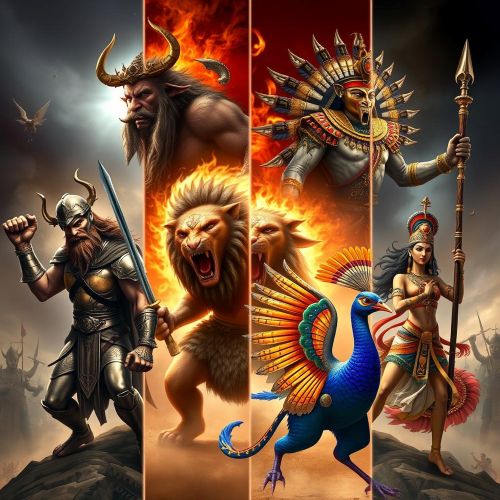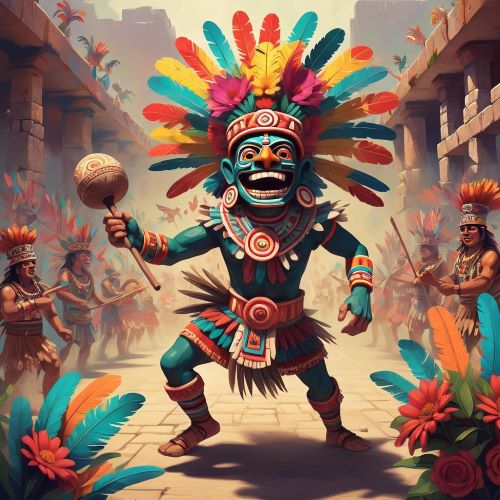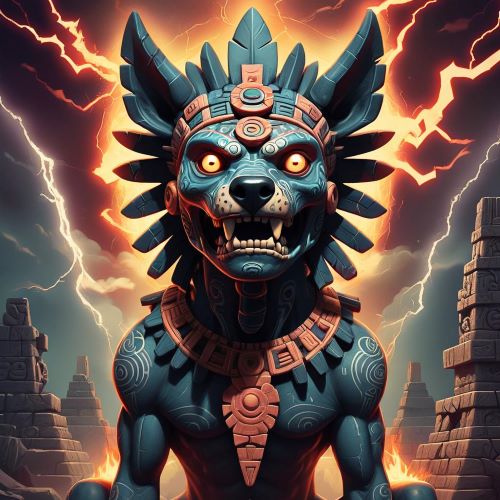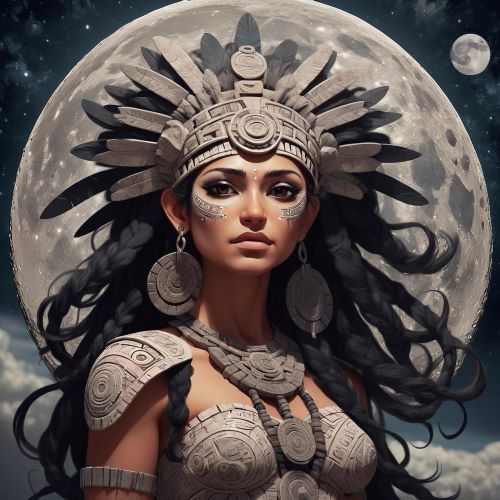Mayahue : Goddess of Maguey
Listen
At a glance
| Description | |
|---|---|
| Origin | Aztec Mythology |
| Classification | Gods |
| Family Members | Tzitzímitl (Grandmother), Ehecatl (Husband), Centzon Totochtin (Children) |
| Region | Mexico |
| Associated With | Maguey Plant |
Mayahue
Introduction
Mayahuel, a deity woven into the intricate fabric of Aztec mythology, holds a significant place as the female deity intricately linked with the maguey plant. This revered figure played a central role in the cultural landscape of central Mexico during the Postclassic era of pre-Columbian Mesoamerican chronology. As the embodiment of the maguey plant, Mayahuel is a key element within a complex network of maternal and fertility goddesses in Aztec religious beliefs.
Her myth resonates with themes of sacrifice and rebirth, mirroring the rhythmic tapping of the tlachique as they skillfully extract the milky aguamiel – the lifeblood of the maguey. This precious substance undergoes a transformative journey, evolving into pulque, the sacred nectar of the gods. Mayahuel’s significance extends beyond the mere cultivation of the maguey; she is revered for her pivotal role in nurturing the land and fostering abundance, marking her as a deity whose influence transcends the constraints of time.
Physical Traits
Mayahuel emerges in artistic representations as a youthful figure emerging gracefully from the heart of a maguey plant. Both the Codex Borgia and the Codex Borbonicus, esteemed sources of Aztec cultural depictions, portray Mayahuel poised atop a maguey plant. Notably, the illustrations not only showcase her in this distinctive position but also employ a shared blue pigment to depict both her body and the maguey plant, suggesting a profound unity between the deity and the plant itself.
Often portrayed as an exceptionally beautiful young woman, Mayahuel’s luminous skin resembles the gleaming obsidian blades utilized for harvesting the maguey. Her flowing, jet-black hair dances in the desert breeze, adorned with intricately woven maguey fibers and fragrant agave blossoms. The depth of her agave-green eyes mirrors the mysteries of life and death, reflecting the shimmering stars when she gracefully moves across the nocturnal expanse. Certain depictions of Mayahuel feature multiple breasts, symbolizing the abundant nourishment provided by the maguey and its ceaseless bounty.
Family
Mayahuel’s familial ties intricately thread through the very fabric of the Aztec pantheon. Within the celestial realm, her grandmother, Tzitzímitl, a formidable star demon, guarded her possessively. However, love found an unexpected path when Ehecatl, the wind god, carried her away on his gentle breeze, daring to defy Tzitzímitl’s wrath. The forbidden union of Mayahuel and Ehecatl gave rise to the Centzon Totochtin, a lively assembly of 400 rabbits embodying mischievous deities associated with both drunkenness and fertility, personifying the intoxicating effects of pulque.
As a member of the Nauhtzonteteo, a group comprising 1,600 gods in Aztec mythology, Mayahuel’s parentage traces back to Omecihuatl and Tecpatl. She holds a significant place within the divine lineage as the consort of Patecatl and the mother of the Centzon Tōtōchtin, famously known as the 400 rabbits. Additionally, Mayahuel is frequently recognized as a consort or wife to Piltzintecuhtli, the solar deity synonymous with youth and growth in Aztec cosmology. These familial connections contribute to Mayahuel’s multifaceted role within the intricate tapestry of Aztec mythology.
Other names
While Mayahuel is commonly recognized by this name, alternative epithets such as “The Woman of 400 Breasts” also exist in certain sources. This particular moniker likely draws symbolic parallels to the numerous sprouts and leaves of the maguey plant, as well as the copious milky juice it yields. Mayahuel, known by various names, gracefully intertwines within the tapestry of Aztec mythology like an elusive phantom.
Xocotl, the goddess synonymous with corn and abundance, shares a kindred spirit with Mayahuel. Another name, Mayahuel Izelpayotl, translates to “Maguey Heart,” emphasizing her profound connection to the very essence of the plant itself. Tzintlimatl, meaning “Hummingbird Woman,” offers a nod to the tiny birds instrumental in pollinating the maguey blossoms, thereby ensuring the perpetuation of its eternal cycle of life and death. Through these diverse names, Mayahuel’s character unfolds, revealing the intricate layers of her significance within the rich mythological landscape of the Aztecs.
Powers and Abilities
Mayahuel is deeply intertwined with the concepts of fertility and sustenance. Serving as the embodiment of the maguey plant, she is intricately linked with the diverse products derived from this plant, extensively utilized throughout the highlands and southeastern regions of Mesoamerica. These products encompass the thorns employed in ceremonial bloodletting rituals and fibers extracted from the leaves, skillfully crafted into ropes, netting, bags, and cloth.
Among the myriad products associated with Mayahuel, perhaps the most renowned is the fermented sap of the maguey plant, transformed into the alcoholic beverage octli, later known as pulque. This libation held cultural and ritual significance, further solidifying Mayahuel’s role as a provider of both material and spiritual abundance.
Mayahuel’s power lies in her life-giving essence. She guides the growth of the maguey, nurturing its sweet aguamiel. She wields the power of intoxication, blurring the lines between reality and ecstasy, between the earthly and the divine. Through pulque, she grants visions and prophecies, unveiling the secrets hidden within the heart of the desert. Her ability to transform and renew, mirroring the maguey’s cycle of death and rebirth, makes her a potent symbol of resilience and hope.
Modern Day Influence
The enduring impact of Mayahuel and the maguey plant resonates strongly in contemporary times. Serving as a cultural icon in both Central Mexico and throughout the entire country, the maguey plant, embodying the spirit of Mayahuel, encapsulates a myriad of symbolic concepts, including love and transformation. It stands as a powerful representation that has given rise to a plethora of resources, with the legendary spirit Mezcal, often hailed as the “elixir of the gods” or the “holy elixir,” being among its notable productions.
Mayahuel’s legacy extends far beyond the confines of ancient Aztec ruins. In present-day Mexico, the maguey plant remains an integral component of cultural identity, fueling vibrant traditions and inspiring exquisite crafts. From the artisanal crafting of mezcal and pulque to the meticulous weaving of maguey fibers, Mayahuel’s spirit is interwoven into every facet of these practices. Contemporary artists draw inspiration from her myth, skillfully incorporating her likeness into tapestries and molding her form from clay, ensuring that Mayahuel’s presence continues to thrive and influence the artistic landscape.
Frequently Asked Questions
What is lorem Ipsum?
I am text block. Click edit button to change this text. Lorem ipsum dolor sit amet, consectetur adipiscing elit. Ut elit tellus, luctus nec ullamcorper mattis, pulvinar dapibus leo.
What is lorem Ipsum?
I am text block. Click edit button to change this text. Lorem ipsum dolor sit amet, consectetur adipiscing elit. Ut elit tellus, luctus nec ullamcorper mattis, pulvinar dapibus leo.
What is lorem Ipsum?
I am text block. Click edit button to change this text. Lorem ipsum dolor sit amet, consectetur adipiscing elit. Ut elit tellus, luctus nec ullamcorper mattis, pulvinar dapibus leo.
What is lorem Ipsum?
I am text block. Click edit button to change this text. Lorem ipsum dolor sit amet, consectetur adipiscing elit. Ut elit tellus, luctus nec ullamcorper mattis, pulvinar dapibus leo.
What is lorem Ipsum?
I am text block. Click edit button to change this text. Lorem ipsum dolor sit amet, consectetur adipiscing elit. Ut elit tellus, luctus nec ullamcorper mattis, pulvinar dapibus leo.







